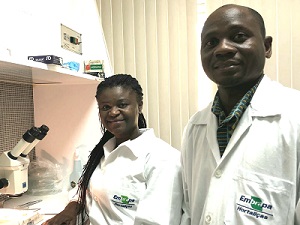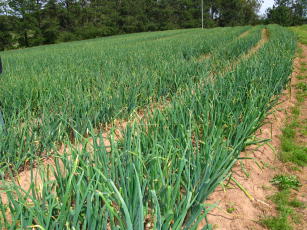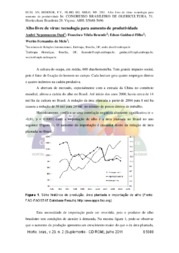Mozambican technicians learn how to produce virus-free garlic
Mozambican technicians learn how to produce virus-free garlic
Being self-sufficient in the production of virus-free garlic: with that purpose, technicians from the area of tissue culture at the Mozambican Agrarian Research Institute (IIAM) were trained in the methodology to produce high plant-health quality garlic seed through the culture of shoot tips in vitro. The expectation, from now on, is that garlic varieties in the African country recover their vigor and thus increase national productivity and minimize virus-free garlic seed imports.
During the second half of August, the technicians Jamisse Gonçalves and Suzana Fernandes learned viral cleaning techniques, indexing and the processes of acclimatization and maintenance of virus-free plants in greenhouses and screens. The capacity-building event took place within the scope of the technical cooperation with Swisscontact, which develops the project named Horti Sempre, which aims at intensifying the production and yield and of vegetables like onions and garlic.
Through the cooperation, in 2017 and 2018 Mozambique imported virus-free garlic seed from Brazil, half a ton of which comprinsing the BRS Hozan cultivar, developed by Embrapa Vegetables. According to the Embrapa Vegetables researcher Francisco Vilela, the training should strengthen garlic-producing regions througout the country and minimize imports.
Gonçalves stressed the importance of training. “We cultivate garlic, but clonal cleaning has not been developed. We have just obtained the technical component that was missing to set up a laboratory that is specific for the activity”, he comments. Suzana Fernandes adds that some techniques they learned can be used for different procedures in other crops.
Garlic is a species with vegetative propagation, which is the cause of the dissemination of viroses. The use of healthy propagation materials such as the virus-free garlic seeds is fundamental to ensure the quality of new plants. Vilela explains that chemical control is not able to reduce the spread of viruses because it only hits vector insects, which may already have transmitted viruses through plantations.
Cooperation: The garlic seed imports and the training are the result of a USA-Mozambique-Brazil trilateral technical cooperation project that was carried out between 2012 and 2015. Embrapa Vegetables was responsible for the production “Vegetable Varieties and Crop Management”, which tested over 100 Brazilian vegetable cultivars in the African country, including garlis. The work held in Mozambique within the project was compiled in the book Horticulture in Mozambique - Characteristics and Production and Post-harvest Technologies: Horticultura em Moçambique – Características, Tecnologias de Produção e de Pós-Colheita (content in Portuguese).
Translation: Mariana Medeiros
Gislene Alencar (MTB/MG 05653JP)
Embrapa Vegetables
Press inquiries
hortalicas.imprensa@embrapa.br
Phone number: 61 3385-9109
Further information on the topic
Citizen Attention Service (SAC)
www.embrapa.br/contact-us/sac/



